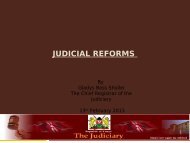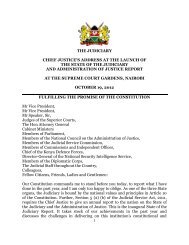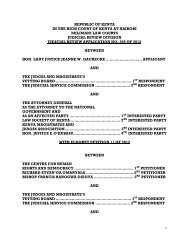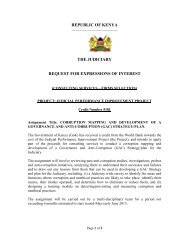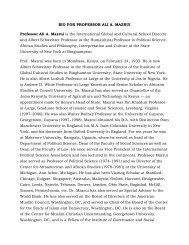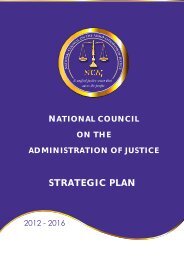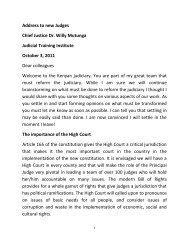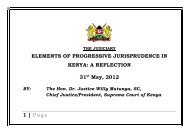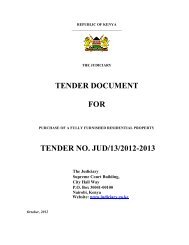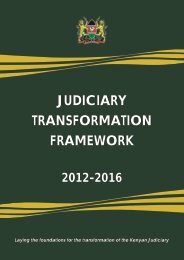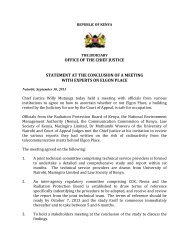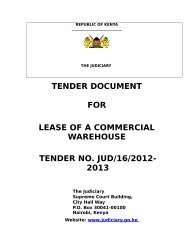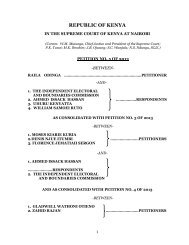Download PDF - The Judiciary
Download PDF - The Judiciary
Download PDF - The Judiciary
Create successful ePaper yourself
Turn your PDF publications into a flip-book with our unique Google optimized e-Paper software.
State of <strong>Judiciary</strong> 2011-2012<br />
87<br />
KENYA HUMAN<br />
RIGHTS<br />
COMMISSION<br />
Established a system for collating public<br />
information and testimony for transmission to<br />
the Judges and Magistrates Vetting Board<br />
Established the Elections Processes and<br />
Monitoring Centre (EPMC), with standing<br />
elections monitors around the country.<br />
Launched the KHRC publication, “Lest<br />
We Forget: <strong>The</strong> Faces of Impunity in<br />
Kenya”, documenting past cases of official<br />
malpractice and recommended sanctions,<br />
as reported in key tribunals, Parliamentary<br />
Committees and commissions of enquiry.<br />
Conducted fact-finding missions to Tana<br />
River to inform interventions towards<br />
restoring lasting peace and calm in Tana<br />
River and beyond<br />
Trained Human Rights networks on the<br />
provisions of the Constitution relating to<br />
Justice Sector Reforms to inform their<br />
participation in CUCs across the country.<br />
Negative impact of silo mentality<br />
and practices hindering the flow<br />
of information<br />
<strong>The</strong> absence of a common<br />
NCAJ work-plan has resulted<br />
in a haphazard approach to<br />
addressing issues in the Justice<br />
Sector.<br />
<strong>The</strong> phased approach to<br />
Justice Sector reforms, with<br />
judicial reforms preceding<br />
comprehensive reforms in<br />
other compatriot agencies<br />
(most notably, reform of the<br />
Kenya Police Service) has had<br />
a disruptive, effect on ongoing<br />
sector-wide reforms.<br />
<strong>The</strong> tendency by government to<br />
present many Bills simultaneously<br />
- often, under intense pressure<br />
of beating constitutionally<br />
prescribed legislation deadlines<br />
- has hampered the adequate<br />
scrutiny by stakeholders. This<br />
has led to poorly drafted laws,<br />
fatally flawed or inoperable<br />
provisions. <strong>The</strong> Power of Mercy<br />
Act (Act Number 21 of 2011),<br />
which was never subjected to<br />
comprehensive stakeholder<br />
participation, is among laws<br />
that cannot serve their intended<br />
purpose.<br />
Lack of a harmonised<br />
interpretation of the Bill of Rights.<br />
Areas of concern are: Rules<br />
of bail and bond; Sentencing,<br />
more so where there is a<br />
statutory imposition of the death<br />
penalty; the interpretation of<br />
life imprisonment and the legal<br />
prescriptions for alternatives to<br />
incarceration.<br />
Establish robust information sharing for<br />
the justice sector<br />
Conduct a comprehensive audit of the<br />
correctional, penal and holding facilities<br />
for purposes of de-contaminating<br />
different cadres of offenders<br />
Build a joint Justice Sector Strategy on<br />
the 2013 Elections<br />
Amend the unworkable provisions of<br />
the Power of Mercy Act to enable the<br />
Power of Mercy Committee execute its<br />
mandate of recommending presidential<br />
pardons, hence, decongesting prisons.<br />
<strong>The</strong> Attorney General and agencies<br />
(CIC and line ministries) to ensure Bills<br />
are processed in a timely fashion;<br />
stakeholders are adequately involved in<br />
debate.<br />
<strong>The</strong> Justice Sector should apply<br />
the experience from the Judicial<br />
Transformation programme as an<br />
illustrative template for rolling out reforms<br />
in the other sector agencies, including<br />
the legal profession. Transitional justice<br />
principles, namely, vetting and lustration,<br />
as well as new doctrines, including,<br />
public participation, should be<br />
advanced across the board as a means<br />
towards transforming the sector.<br />
<strong>The</strong> NCAJ should lead the process of<br />
establishing guidelines and rules on<br />
various aspects of administration of<br />
justice, including bail, sentencing and<br />
alternative dispute resolution.<br />
NATIONAL<br />
COUNCIL FOR<br />
LAW REPORTING<br />
Facilitated the development of a robust,<br />
indigenous, progressive and patriotic<br />
jurisprudence<br />
Enhanced the financial, infrastructural and<br />
human resources of the Council<br />
Compiled a specialised set of legal<br />
reference materials on the law and<br />
jurisprudence of elections as well<br />
as emerging jurisprudence on the<br />
interpretation of the constitution particularly<br />
on the Bill of Rights, leadership and integrity<br />
Lack of adequate resources to<br />
effectively fulfil NCLR’s mandate<br />
Legal risks and liabilities<br />
associated with publishing and<br />
dissemination of information<br />
Dynamic changes in technology<br />
for which NCLR has limited<br />
resources to pace<br />
Increase financial, human and<br />
infrastructural resources allocation<br />
to the Council to enable it meet the<br />
demands of the transformed <strong>Judiciary</strong><br />
and the expectations of Kenyans under<br />
the new Constitution<br />
Democratise access to public legal<br />
information through the use of national<br />
language<br />
Leverage on partnerships with the<br />
<strong>Judiciary</strong> Training Institute, Kenya<br />
School of Law and other stakeholders<br />
in improving the quality and quantity of<br />
legal resource materials



